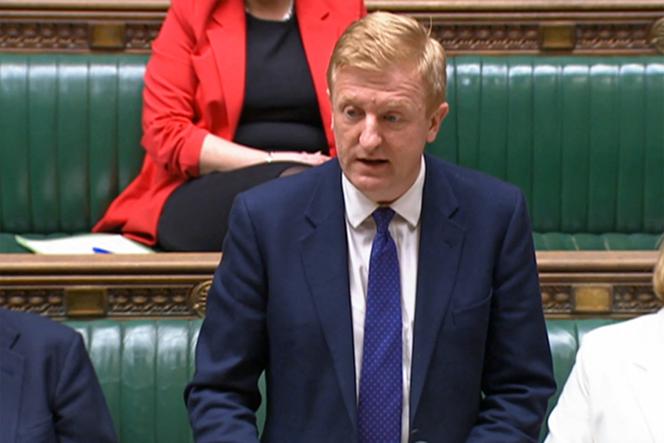


The UK on Monday, March 25, accused Beijing-linked organizations of orchestrating two "malicious" cyber campaigns, calling in China's ambassador to protest and sanctioning those it branded responsible.
The announcement came as the US Department of Justice in Washington said it had charged seven Chinese nationals in connection with a 14-year campaign against critics of Beijing.
In London, Deputy Prime Minister Oliver Dowden told MPs that the attacks in 2021 and 2022 had compromised the Electoral Commission and UK parliamentary accounts, including those of lawmakers critical of China. "Chinese state-affiliated actors were responsible for two malicious cyber campaigns targeting both our democratic institutions and parliamentarians," he said.
The hacks, by what he said were "Chinese state-affiliated actors," were "the latest in a clear pattern of hostile activity originating in China." But he stressed that both, while a "real and serious threat," were unsuccessful. "The compromise has not affected the security of elections. It will not impact how people register, vote or otherwise participate in democratic processes," Dowden said. Parliament's cybersecurity measures blocked the second email campaign, he added.
Across the Atlantic, US Deputy Attorney General Lisa Monaco said more than 10,000 emails were sent as part of a "prolific global hacking operation" targeting US and foreign-based businesses, politicians and journalists. The aim, she added, was "to repress critics of the Chinese regime, compromise government institutions, and steal trade secrets."
Two individuals and one company linked to the group suspected of orchestrating the campaign – APT31 – have been hit with sanctions. China's ambassador to London will be summoned "to account for China's conduct," Dowden told MPs, while Foreign Secretary David Cameron said he had raised the issue with his counterpart Wang Yi.
Cameron – who as prime minister from 2010 to 2016 had pushed strongly for closer UK ties with China – called the actions "completely unacceptable."
UK Prime Minister Rishi Sunak said earlier that the government had "invested significantly" in capabilities and tools to protect the country, saying China posed "an economic threat to our security and an epoch-defining challenge."
Both the UK and the United States have blamed APT31, which they said has links to Chinese intelligence. The allies are each holding leadership elections this year and said they had tightened their defenses against such attacks.
"Today’s announcements underscore the need to remain vigilant to cybersecurity threats and the potential for cyber-enabled foreign malign influence efforts, especially as we approach the 2024 election cycle," US Assistant Attorney General Matthew Olsen said.
In Washington, the Treasury Department said it sanctioned Wuhan Xiaoruizhi Science and Technology Company Ltd., which it calls a Chinese Ministry of State Security front company that has “served as cover for multiple malicious cyber operations.” It named two Chinese nationals, Zhao Guangzong and Ni Gaobin, affiliated with the Wuhan company, for cyber operations that targeted US critical infrastructure sectors including defense, aerospace and energy. The US Justice Department charged Zhao, Ni, and five other hackers with conspiracy to commit computer intrusions and wire fraud.
China's foreign ministry spokesperson Lin Jian on Monday dismissed the allegations, saying Beijing had been "resolute" in curbing and striking down "all kinds of malicious cyber-activities." "The issue of tracing cyber-attacks is highly complex and sensitive," he said, adding: "When investigating and determining the nature of cyber-incidents, there should be ample objective evidence, instead of smearing other countries without factual basis, let alone politicizing cyber-security issues."
Conservative MP Iain Duncan Smith, one of the targeted MPs, said Beijing should be labeled a threat – rather than a "challenge" – to the UK. "Today's announcement should mark a watershed moment where the UK takes a stand for values of human rights and the international rules-based system on which we all depend," he told a London news conference.
Duncan Smith was one of several UK MPs sanctioned by China in 2021 because of his criticisms of alleged human rights abuses of the Uyghur minority and a squeeze on rights in Hong Kong. He said the UK had been subjected to "harassment, impersonation and attempted hacking" from China for some time.
China has consistently denied accusations of espionage and other wrongdoing.
